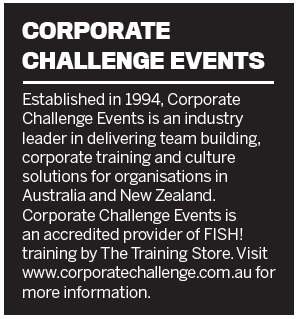
Team cohesion is an essential feature of the modern workplace environment. So how can managers better enhance their staff’s teamwork?
.jpg)
Team cohesion is an essential feature of the modern workplace environment. So how can managers better enhance their staff’s teamwork?
The last 20 years or so have seen corporate team building undergo a considerable evolution. The cringey ’90s cliché of unfortunate team members being asked to fall back into a ‘trust circle’ after hours of collective arrhythmic drumming is now a thing of the past.
Rather, team-building exercises of the 21st century are instead aimed at providing a more meaningful experience, one with lasting impact and positive benefits for the team – and actually encouraging employees to have fun in the process, too.
Michael Cromie, general manager of Corporate Challenge Events, is passionate about the positive impact that team-building events can have on the collective psyche of the workplace.
“What people often don’t realise is that the environment for team-building activities is completely – and deliberately – different from the workplace,” says Cromie. “When you take people out of their day-to-day workplaces, it allows them to step up and demonstrate qualities that may not have been noticed before.”
Bringing employees on board
Still, some negative stereotypes around team-building days have lingered in the popular consciousness, even if the reality is far different. For this and other reasons, workers are not always enthused about the idea of spending the day with their co-workers outside of the office environment.
Nonetheless, Cromie contends that this doesn’t necessarily need to be a barrier to a successful team-building experience.
“Ultimately, managers are responsible for selling their staff on the idea,” he says. “But the upside is that most people like to have fun. If you can leverage that, you’re going to get much better results.”
Where managers often put their foot wrong is focusing on the ways team building will benefit the business as a whole, rather than the individuals involved. While it’s true that this is an important component of team-building exercises, it’s an impersonal approach that makes employees feel as though they are assets, not people.

Rather than doing this, Cromie says making team-building events sound like an invitation to fun – not simply a workplace obligation – will encourage more active and positive participation, which in turn yields a better experience for everyone on the day. Additionally, explaining how the positive effects of team-building activities can directly benefit employees as individuals will also make for a more cooperative team.
Benefits of team building
At its most basic level, team building provides an opportunity to remove staff from an office environment so they can get to know one another on a different, more intimate level. It also provides opportunities for people to try out activities that they might not otherwise get to experience.
Importantly, it often requires staff to learn new communication strategies for working alongside each other in new situations, enhancing existing intra-office friendships and hopefully creating new ones. When used correctly, this combination of elements can feed back into employees’ working relationships, enabling them to work alongside one another more effectively and creating a better collaborative environment.
“It helps your employees get a better understanding of each other’s strengths and weaknesses, which helps them to better complement each other once they’re back in the workplace,” says Cromie.
Selecting the best activity of your team
During his time in the industry, Cromie has worked with a huge variety of organisations in search of team-building activities. He stresses that it is important for organisations to be transparent about their previous forays into team building so that programs can be properly tailored to avoid any past pitfalls, while ensuring a new and unique experience. Team-building exercises can involve the investment of considerable time and money, so it’s important to ensure there are measurable effects in place, developed in conjunction with your provider.
“Make sure you are clear about your objectives,” says Cromie. “This helps providers like us offer a palette of activity options for your specific needs.”
Typically there will be some back and forth between the client and the provider to determine group size, desired outcomes and suitability of individual activities.
“As you might expect, managers tend to look for more outcome-focused events,” says Cromie. “Staff typically just want to have fun. But I think there’s room for both if you choose the right program.”
Many organisations also seek to combine their philanthropic efforts with team building. With more companies investing in corporate responsibility programs and looking to give back to the community, charity-based teambuilding programs continue to increase in popularity. Some options have included constructing furniture, toys or other items for disadvantaged members of the community, while others choose to look at creative fundraising activities.
Additionally, Cromie notes that a lack of time is often an issue for businesses. In the ever-changing modern marketplace, allotting several consecutive days for a corporate retreat is often unfeasible. There’s been an increased shift towards shorter events, running anywhere from two hours to half a day.
Nonetheless, Cromie remains resolutely positive about the benefits such events can offer. Currently, Corporate Challenge Events offers more than 40 different team-building options, customisable for a wide range of age groups, ability levels and time required away from the office.

Being out of the enclosed office naturally introduces a new set of potential risks for employees. Awareness is crucial, and it is essential for any provider to carefully outline safety requirements to participants from the outset.
Corporate Challenge Events places substantial emphasis on safety, with Cromie describing it as “paramount”. The activities of the organisation are deliberately lowrisk, aimed at ensuring all participants feel comfortable with what they are doing and only challenge themselves if they are able.
“People have different levels of limitations, and coordinators need to be mindful of people’s individual needs,” says Cromie. “Bringing them out of their comfort zone in an affirming way can be very positive, but throwing them into the deep end can potentially cause injury, or just sour them on the experience.”
Creating a better work environment
The reasons for seeking a team-building day are complex and will vary from organisation to organisation. It might be to mix up teams so different departments are learning to work together, to teach more effective leadership skills, to enable staff to communicate more effectively, or to assess the next generation of leadership talent within your team.
Recent years haven’t just seen a shift in the style and delivery method of teambuilding activities; there’s also been a shift in the staff they’re offered to. Traditionally, team building events have tended to be seen as important opportunities for senior staff, such as department heads. This is understandable, given that senior staff often have a much broader umbrella of responsibilities and work with a much wider range of staff than their subordinates. Cooperation and team cohesion is especially important at this level.
Nonetheless, many organisations are now seeing the value in offering these teambuilding opportunities to more junior staff. Ingraining a better attitude to teamwork at an earlier stage of employment will theoretically yield far more long-term benefits – and people can enjoy themselves while creating a better workplace culture, too.
“After our events, we always have participants say that they didn’t expect to have as much fun as they did,” says Cromie. “If people walk away from our events with a more positive mindset and attitude about their team, then we have done our job.”